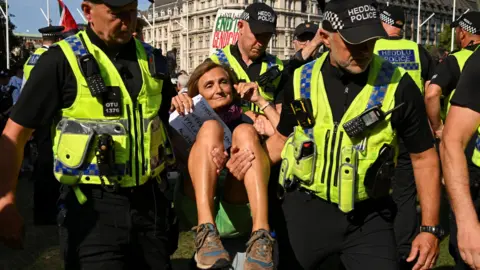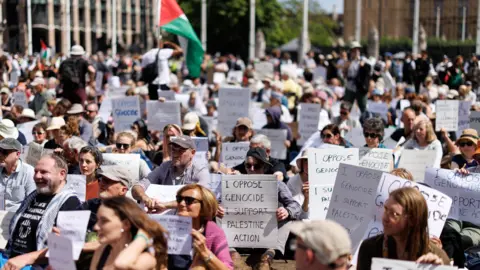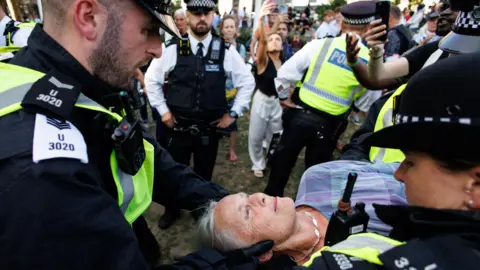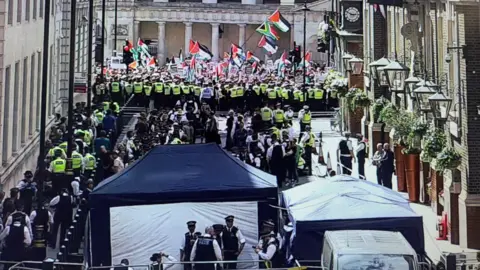 Reuters
ReutersThe pictures from last week’s sit-in protest in Parliament Square over the banned group Palestine Action were unprecedented.
As demonstrators held up placards reading, “I support Palestine Action”, some 522 of them were arrested on suspicion of breaking terrorism laws – more than double the total such arrests in 2024.
Their average age was 54, said the police. Some 112 of them were over 70 years old.
The battle over the ban on Palestine Action (PAG) – last month, proscribed as a terrorist organisation in the UK – now feels as much a political and PR battle as a legal one.
And the organisers of the campaign are trying to capitalise on perceived sympathy among some of the public by organising another demonstration in September – hoping to force the state, through numbers, to lift the ban.
How does it end?
Does it risk becoming an “I am Spartacus moment”? – the words of Baroness Shami Chakrabarti, the Labour peer and civil rights campaigner?
That depends on three courtroom battles that will each, in turn, influence how Palestine Action is publicly perceived and legally characterised.
Let’s start with the protesters arrested since July for showing support for the group – more than 700 so far.
One lawyer says it has been awkward so far for police officers.
“I’ve seen police look incredibly uncomfortable with the fact that they are having to treat these elderly people as criminals,” said solicitor Katie McFadden, who advised many protesters, after their arrests, last Saturday.
“I’ve seen them in police custody and they’ve certainly been considerate and looked, frankly, quite shocked and horrified that this is what they were having to do as part of their job when they’ve signed up to go out and protect the public from dangerous criminals.”
The real challenge for the police and prosecutors is how many protesters do they need to charge with support of a banned terrorist organisation to send a message to the public. And what message do they send if they don’t charge them all?
 EPA
EPASo far, three people have been charged with displaying an item showing support for Palestine Action during the first demonstration on 5 July. They will all appear in court next month.
The director of public prosecutions, Stephen Parkinson, had to consult the Attorney General’s Office before he could go ahead with the charges because of additional safeguards in some terrorism cases.
That means that Lord Hermer, the Attorney General and also a cabinet minister, or his deputy, may have to be involved in each of the files that police send to prosecutors.
That, in turn, means the vast majority of the 700 may not know for months if they are going to end up on trial – in cases that could be more than a year away from a jury.
Just assuming they do get charged, history suggests the risk of a maximum of 14-year sentence is low.
Conventionally, a conviction like this would leave careers in tatters and have other life-changing effects.
The equation for some Palestine Action protesters is different.
Many are older people who have graduated from involvement in climate change activism and believe the ban breaches free speech safeguards. It seems many have fewer fears about the impact of arrest on their day-to-day lives.
So is the ban on Palestine Action a legal and PR disaster in the making for Home Secretary Yvette Cooper?
Huda Ammori, Palestine Action’s co-founder, has said on social media: “The system can’t cope when thousands resist.”
 EPA
EPABut ministers hope that the difference between the organisation she founded and other forms of protest over Gaza will become clear thanks to the second of the three linked legal battles soon to take centre stage.
In August 2024 alleged PAG supporters broke into Elbit Systems UK in Bristol, an Israeli defence firm that has long been a key target.
A repurposed prison van smashed through a security fence and crowbars and a sledgehammer were allegedly used to smash up equipment.
Three people were injured: a security guard and two police officers.
Palestine Action promoted video of the damage – but not any pictures of the alleged assaults.
Those allegations begin to come to trial in November. Some 18 people deny charges including criminal damage, assault causing actual bodily harm, violent disorder and aggravated burglary.
That incident prompted national security officials and the police to look at whether a terrorism ban on PAG could be justified, after having previously concluded that the vast majority of its highly disruptive activities amounted to minor criminal damage.
 Metropolitan Police
Metropolitan PoliceDocuments disclosed to the BBC in the High Court show how the thinking on a ban had evolved. Palestine Action was becoming more militant, said officials. It had allegedly produced an “underground manual” that it was claimed detailed how to plan a “break-in”, referring to face masks, burner phones and fake car number plates.
“With an efficient sledgehammer in your hand, you can cause quite a bit of damage,” the manual read, before than detailing how to do so.
And this is where the UK’s wide definition of terrorism comes in. It includes not just the threat or use of violence to advance a cause – but also the use of serious criminal damage.
That’s because in the 1990s the IRA began causing economic damage through bombs, without taking life.
So when Cooper banned PAG, her decision was largely informed by what the Home Office has described as millions of pounds of criminal damage, not an assessment that it was a group of murderous militants.
“Proscription is about one narrow group that has been involved in violent attacks including injuries, including weapons, smoke bombs causing panic among innocent people, major criminal damage,” the home secretary said following last Saturday’s arrests.
“There may be people who are objecting to proscription who don’t know the full nature of this organisation due to court restrictions on reporting while serious prosecutions are under way but it’s really important that no one is in any doubt that this is not a non-violent organisation.”
 TOLGA AKMEN/EPA/Shutterstock
TOLGA AKMEN/EPA/ShutterstockMs Ammori has contested this characterisation, saying the government’s own papers show that Palestine Action did not advocate for violence.
This brings us to the third of the three big legal challenges that will decide this affair: was the Home Secretary right?
The High Court will consider in the autumn if the ban was a rational and proportionate response to PAG’s activities.
Jonathan Hall KC, the independent watchdog of terrorism laws, has previously told BBC News that the ban is legally workable because the group had moved from protest into what is effectively “blackmail” – suggesting it was exerting pressure to get what it wanted.
But Ms Ammori’s legal team have a range of significant arguments around freedom of protest.
Volker Turk, the United Nations’ human rights chief has got involved too, saying the ban is so wrong it places the UK outside international law.
The outcome of that case will define whether Palestine Action remains banned. If the ban falls, then the 700 arrested so far are free – their cases would collapse. As for the group itself, it may feel emboldened – but would know that it could still be banned again if its actions cross the terrorism laws line.
If the ban stands, then the advantage will be with the government – and arrests and charges will continue.
That is the counter-terrorism policing way: slowly but surely, step by step, seek to contain and, ultimately, crush the threat.
www.bbc.com (Article Sourced Website)
#mass #arrests #Palestine #Action #ban

